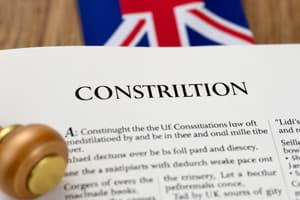Podcast
Questions and Answers
What is the primary source of law in the UK that represents the will of the legislature?
What is the primary source of law in the UK that represents the will of the legislature?
- Legislation (correct)
- Common law
- Case law
- European Union law
Which source of law is formed by judges' decisions in particular cases?
Which source of law is formed by judges' decisions in particular cases?
- Case law (correct)
- Legislation
- Statutory Instruments
- European Convention on Human Rights
In the UK Parliament, what does the term 'bicameral' refer to?
In the UK Parliament, what does the term 'bicameral' refer to?
- A parliament with one house
- A parliament with multiple chambers
- A system with elected officials only
- A parliament with two houses (correct)
What is the role of the House of Lords within the UK Parliament?
What is the role of the House of Lords within the UK Parliament?
What is the highest court of appeal for all jurisdictions in the UK?
What is the highest court of appeal for all jurisdictions in the UK?
Which source of law was considered before 31st December 2020 but is not now recognized in the same way?
Which source of law was considered before 31st December 2020 but is not now recognized in the same way?
What must both the House of Commons and House of Lords do for new legislation?
What must both the House of Commons and House of Lords do for new legislation?
What is the significance of statutes in relation to case law?
What is the significance of statutes in relation to case law?
What significant change did the Human Rights Act 1998 introduce in the UK's legal framework?
What significant change did the Human Rights Act 1998 introduce in the UK's legal framework?
Which of the following acts is associated with notable reforms proposed by the Law Commission?
Which of the following acts is associated with notable reforms proposed by the Law Commission?
What tension does the Human Rights Act 1998 illustrate in its operation?
What tension does the Human Rights Act 1998 illustrate in its operation?
Why are many proposals by the Law Commission not enacted?
Why are many proposals by the Law Commission not enacted?
What has been a recent contentious proposal regarding the Human Rights Act 1998?
What has been a recent contentious proposal regarding the Human Rights Act 1998?
Which Articles of the ECHR cannot be subject to derogation?
Which Articles of the ECHR cannot be subject to derogation?
What principle allows member states to exercise discretion in interpreting Convention rights?
What principle allows member states to exercise discretion in interpreting Convention rights?
Which Article protects the right to a fair trial?
Which Article protects the right to a fair trial?
Which section of the Human Rights Act 1998 mandates compatibility of legislation with ECHR rights?
Which section of the Human Rights Act 1998 mandates compatibility of legislation with ECHR rights?
In which case did the European Court of Human Rights rule on the display of crucifixes in Italian public schools?
In which case did the European Court of Human Rights rule on the display of crucifixes in Italian public schools?
Which of the following rights is considered absolute and cannot be subject to derogation?
Which of the following rights is considered absolute and cannot be subject to derogation?
What does Section 6 of the Human Rights Act 1998 state?
What does Section 6 of the Human Rights Act 1998 state?
Which concept requires that state interference with human rights is necessary, appropriate, and reasonable?
Which concept requires that state interference with human rights is necessary, appropriate, and reasonable?
Which Article prohibits discrimination?
Which Article prohibits discrimination?
What is a 'declaration of incompatibility'?
What is a 'declaration of incompatibility'?
Which of the following is not a function of the Human Rights Act 1998?
Which of the following is not a function of the Human Rights Act 1998?
Which of the following freedoms is protected under Article 10?
Which of the following freedoms is protected under Article 10?
According to the principle of proportionality, what must be true of a measure affecting a fundamental right?
According to the principle of proportionality, what must be true of a measure affecting a fundamental right?
What does derogation allow a member state to do?
What does derogation allow a member state to do?
What is the purpose of publishing a green paper?
What is the purpose of publishing a green paper?
What does the doctrine of binding precedent, also known as stare decisis, entail?
What does the doctrine of binding precedent, also known as stare decisis, entail?
Which type of legislation expresses the will of the people through elected representatives?
Which type of legislation expresses the will of the people through elected representatives?
What is the function of statutory instruments in the legislative process?
What is the function of statutory instruments in the legislative process?
Which act established the Scottish Parliament?
Which act established the Scottish Parliament?
What defines the scope of legislative powers for devolved nations in the UK?
What defines the scope of legislative powers for devolved nations in the UK?
How does common law differ from primary legislation?
How does common law differ from primary legislation?
What is the primary role of the Law Commission?
What is the primary role of the Law Commission?
What was the effect of the Treaty of Lisbon in 2009 on EU law?
What was the effect of the Treaty of Lisbon in 2009 on EU law?
What characterizes European Union law as a system?
What characterizes European Union law as a system?
What defines secondary legislation in relation to primary legislation?
What defines secondary legislation in relation to primary legislation?
What legislative body is responsible for establishing the Welsh Assembly?
What legislative body is responsible for establishing the Welsh Assembly?
Which of the following best describes common law?
Which of the following best describes common law?
What is the primary objective of retained EU law (REUL)?
What is the primary objective of retained EU law (REUL)?
What significant change did the Retained EU Law (Revocation and Reform) Act 2023 introduce?
What significant change did the Retained EU Law (Revocation and Reform) Act 2023 introduce?
Which document played a foundational role in the protection of human rights prior to the European Convention on Human Rights?
Which document played a foundational role in the protection of human rights prior to the European Convention on Human Rights?
How do UK domestic courts interpret retained EU law after the 2023 Act?
How do UK domestic courts interpret retained EU law after the 2023 Act?
What was included in the scope of the European Convention on Human Rights?
What was included in the scope of the European Convention on Human Rights?
What is the relationship between the ECHR and the EU?
What is the relationship between the ECHR and the EU?
What key principle did the Magna Carta establish regarding citizens' rights?
What key principle did the Magna Carta establish regarding citizens' rights?
What key effect did the Human Rights Act 1998 have on UK law?
What key effect did the Human Rights Act 1998 have on UK law?
Under the ECHR, who can bring a case if they believe their rights have been violated?
Under the ECHR, who can bring a case if they believe their rights have been violated?
According to the 2023 Act, which factor is now removed in interpreting assimilated law?
According to the 2023 Act, which factor is now removed in interpreting assimilated law?
What does the term 'negative theory of rights' refer to in English law prior to the ECHR?
What does the term 'negative theory of rights' refer to in English law prior to the ECHR?
What was a significant feature abolished by the Retained EU Law (Revocation and Reform) Act 2023?
What was a significant feature abolished by the Retained EU Law (Revocation and Reform) Act 2023?
What does the term 'retained EU law' refer to in the UK legal context?
What does the term 'retained EU law' refer to in the UK legal context?
What year did the UK leave the EU, marking the end of the implementation period where EU law was a source of UK law?
What year did the UK leave the EU, marking the end of the implementation period where EU law was a source of UK law?
What is the purpose of Section 10 of the Human Rights Act?
What is the purpose of Section 10 of the Human Rights Act?
What was the main focus of the Independent Review of the Human Rights Act?
What was the main focus of the Independent Review of the Human Rights Act?
How does parliamentary sovereignty affect the Human Rights Act?
How does parliamentary sovereignty affect the Human Rights Act?
What is a significant proposed change in the consultation after the 2020 Independent Review?
What is a significant proposed change in the consultation after the 2020 Independent Review?
How do the sources of law in England and Wales primarily differ from those in civil law systems?
How do the sources of law in England and Wales primarily differ from those in civil law systems?
What impact does the dualist system have on international treaties in England?
What impact does the dualist system have on international treaties in England?
What defines the role of the Law Commission in England and Wales?
What defines the role of the Law Commission in England and Wales?
What consequence did the withdrawal of the Bill of Rights Bill in June 2023 indicate?
What consequence did the withdrawal of the Bill of Rights Bill in June 2023 indicate?
How does judicial precedent function in the English legal system?
How does judicial precedent function in the English legal system?
What is one of the primary characteristics of civil law systems compared to common law systems?
What is one of the primary characteristics of civil law systems compared to common law systems?
In what way does section 19 of the Human Rights Act embed human rights considerations?
In what way does section 19 of the Human Rights Act embed human rights considerations?
What happens to international treaties ratified by the UK under the dualist system?
What happens to international treaties ratified by the UK under the dualist system?
Which of the following statements is true regarding the impact of the Human Rights Act on legislative power?
Which of the following statements is true regarding the impact of the Human Rights Act on legislative power?
Flashcards
Sources of Law
Sources of Law
The different ways laws are created, including legislation, judicial decisions, and international agreements.
Legislation/Statute
Legislation/Statute
A written law passed by a legislature (e.g., Parliament).
Case Law/Precedent
Case Law/Precedent
Laws developed through court decisions (judges' rulings).
UK Parliament
UK Parliament
Signup and view all the flashcards
House of Commons
House of Commons
Signup and view all the flashcards
House of Lords
House of Lords
Signup and view all the flashcards
Bicameral Parliament
Bicameral Parliament
Signup and view all the flashcards
Jurisdiction
Jurisdiction
Signup and view all the flashcards
Retained EU Law (REUL)
Retained EU Law (REUL)
Signup and view all the flashcards
European Union (Withdrawal) Act 2018
European Union (Withdrawal) Act 2018
Signup and view all the flashcards
Assimilated Law
Assimilated Law
Signup and view all the flashcards
Retained EU Law (Revocation and Reform) Act 2023
Retained EU Law (Revocation and Reform) Act 2023
Signup and view all the flashcards
Green Paper
Green Paper
Signup and view all the flashcards
White Paper
White Paper
Signup and view all the flashcards
EU Law Supremacy
EU Law Supremacy
Signup and view all the flashcards
Draft Bill
Draft Bill
Signup and view all the flashcards
European Convention on Human Rights (ECHR)
European Convention on Human Rights (ECHR)
Signup and view all the flashcards
Human Rights Act 1998 (HRA)
Human Rights Act 1998 (HRA)
Signup and view all the flashcards
Common Law
Common Law
Signup and view all the flashcards
Binding Precedent
Binding Precedent
Signup and view all the flashcards
European Court of Human Rights (ECtHR)
European Court of Human Rights (ECtHR)
Signup and view all the flashcards
Magna Carta
Magna Carta
Signup and view all the flashcards
Stare Decisis
Stare Decisis
Signup and view all the flashcards
Negative Theory of Rights
Negative Theory of Rights
Signup and view all the flashcards
Primary Legislation
Primary Legislation
Signup and view all the flashcards
English Common Law
English Common Law
Signup and view all the flashcards
Secondary Legislation
Secondary Legislation
Signup and view all the flashcards
Brexit
Brexit
Signup and view all the flashcards
Statutory Instruments (SIs)
Statutory Instruments (SIs)
Signup and view all the flashcards
Devolution
Devolution
Signup and view all the flashcards
Transition Period (Brexit)
Transition Period (Brexit)
Signup and view all the flashcards
EU
EU
Signup and view all the flashcards
EU Withdrawal Agreement
EU Withdrawal Agreement
Signup and view all the flashcards
ECHR
ECHR
Signup and view all the flashcards
Act of Parliament
Act of Parliament
Signup and view all the flashcards
Royal Assent
Royal Assent
Signup and view all the flashcards
Law Commission
Law Commission
Signup and view all the flashcards
Contracts (Rights of Third Parties) Act 1999
Contracts (Rights of Third Parties) Act 1999
Signup and view all the flashcards
Land Registration Act 2002
Land Registration Act 2002
Signup and view all the flashcards
Human Rights Act 1998
Human Rights Act 1998
Signup and view all the flashcards
Parliamentary Sovereignty
Parliamentary Sovereignty
Signup and view all the flashcards
Article 2
Article 2
Signup and view all the flashcards
Article 3
Article 3
Signup and view all the flashcards
Absolute Rights
Absolute Rights
Signup and view all the flashcards
Margin of Appreciation
Margin of Appreciation
Signup and view all the flashcards
Lautsi v Italy
Lautsi v Italy
Signup and view all the flashcards
Proportionality
Proportionality
Signup and view all the flashcards
Section 2 (HRA)
Section 2 (HRA)
Signup and view all the flashcards
Section 3 (HRA)
Section 3 (HRA)
Signup and view all the flashcards
Section 4 (HRA)
Section 4 (HRA)
Signup and view all the flashcards
Section 6 (HRA)
Section 6 (HRA)
Signup and view all the flashcards
Declaration of Incompatibility
Declaration of Incompatibility
Signup and view all the flashcards
Human Rights Act (HRA)
Human Rights Act (HRA)
Signup and view all the flashcards
Fast-track Procedure (HRA)
Fast-track Procedure (HRA)
Signup and view all the flashcards
Convention Rights
Convention Rights
Signup and view all the flashcards
Independent Review of the HRA
Independent Review of the HRA
Signup and view all the flashcards
Strasbourg
Strasbourg
Signup and view all the flashcards
Modern Bill of Rights
Modern Bill of Rights
Signup and view all the flashcards
Civil Law System
Civil Law System
Signup and view all the flashcards
Codified Law
Codified Law
Signup and view all the flashcards
Judicial Precedent
Judicial Precedent
Signup and view all the flashcards
Dualist System
Dualist System
Signup and view all the flashcards
Law Reform
Law Reform
Signup and view all the flashcards
Study Notes
Sources of Law
- Laws are created through legislation (statutes/Acts of Parliament), judicial decisions (precedent/common law/case law), the European Convention on Human Rights (incorporated through the Human Rights Act 1998). EU law was a source until 2020.
- Three main jurisdictions exist: England and Wales, Northern Ireland, and Scotland. Each has its own legal systems, but legislation from Westminster often applies similarly. The UK Supreme Court is the final appeal court for all.
- Parliament, the sovereign law-making body in England and Wales, is bicameral (House of Commons and House of Lords). The House of Commons is elected, while the House of Lords has appointed or inherited members. Both bodies are involved in enacting legislation.
- Legislation development typically involves a consultation process: green paper, white paper, draft bill, debate, amendments, and Royal assent.
- Valid Acts of Parliament (AOP) have precedence over case law. Legislation can also override inconsistent common law.
Common Law and Statute
- Common law (judge-made law) is derived from precedent and custom, originating from King Henry II. The doctrine of stare decisis (following precedent) is fundamental.
- It encompasses both substantive rules (e.g., murder) and procedural rules.
- Common law rules can be superseded by legislation or “trumped” by it.
- Common law offences are now often defined and governed by statutes (e.g., theft).
- Judges cannot fundamentally change out-dated laws codified in statutes; only Parliament can. Law Commissions typically research and recommend reforms.
Primary and Secondary Legislation
- Primary legislation includes Acts of Parliament. These are written laws expressing the mandate of the people.
- Secondary legislation (statutory instruments) are detailed rules created under the authority of an Act. They are made by ministers or other bodies within the power granted by primary legislation to fill in the detail of Acts.
- Many statutory instruments come into force automatically. Others are subject to parliament debate and annulment within a set period.
Devolved Legislation
- Devolution transferred powers to the Scottish Parliament, the Welsh Assembly, and the Northern Ireland Assembly.
- The legislative scope differs for each, but they are bound by the UK Parliament for much legislation.
Courts and Common Law
- Case law, established by courts, is often the main source of legal principles.
- Common law jurisdictions (e.g., England and Wales) have relied heavily on decisions in individual cases to establish fundamental rules, not necessarily through explicit Parliamentary Acts.
European Union Law (pre-2020)
- EU law was a major legal influence until the UK withdrew in 2020.
- EU law is now irrelevant in the UK system due to the UK's withdrawal from the EU.
- The EU (Withdrawal) Act 2018 created "retained EU law" which maintained consistency post-Brexit.
Retained EU Law and the 2023 Act
- The Retained EU Law (Revocation and Reform) Act 2023 changed retained EU law to "assimilated law".
- This Act removed the supremacy of EU law and removed EU principles from interpreting legislation. It also modified the role of the courts regarding interpreting EU-derived legislation.
European Convention on Human Rights (ECHR)
- The ECHR (and the Council of Europe) are separate from the EU. The UK was bound by the ECHR even after Brexit.
- The Human Rights Act 1998 (HRA) incorporated ECHR into UK law.
- This Act allows citizens to pursue human rights claims in UK courts.
- The European Court of Human Rights (ECtHR) sits in Strasbourg.
Human Rights Act 1998 (HRA) operation
- Section 2 requires courts to consider ECtHR decisions.
- Section 3 demands interpreting legislation to comply with Convention rights when possible.
- Section 4 allows courts to declare legislation incompatible with Convention rights.
- Section 6 makes it unlawful for public authorities to act in ways incompatible with the Convention.
- Sections 10, 19 provide for legislative amendments and government declarations of Convention compatibility.
Parliamentary Sovereignty and Amendments
- The HRA balances human rights with parliamentary sovereignty.
- Courts cannot invalidate legislation but can alert Parliament of potential breaches.
Comparison with Civil Law Systems
- England and Wales primarily use statutes and common law, while civil law systems (e.g., France) primarily rely on codified legislation (e.g., Civil Code). Case precedent is different in force.
International Law and Dualism
- International law generally does not automatically become UK law; it must be incorporated through an Act.
- The dualist system contrasts with civil law systems where these treaties automatically become part of domestic law.
Law Reform and Law Commissions
- Law Commissions review and recommend reforms to UK law.
- Although recommendations are made, it is up to Parliament to implement them.
Studying That Suits You
Use AI to generate personalized quizzes and flashcards to suit your learning preferences.




